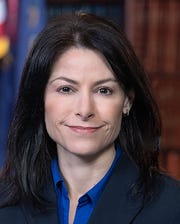Lansing — A statewide task
force will address the legal, social and judicial shortfalls that have
in some part allowed for the abuse of roughly 73,000 older adults in
Michigan.
The Elder Abuse Task Force
announced Monday by Attorney General Dana Nessel has support from
prosecutors and law enforcement, probate courts, health care
associations and elder law groups. The task force will include members
of the Michigan Supreme Court, the governor’s office, county
prosecutors, state and federal lawmakers, advocacy groups and 13 people
from the Attorney General's office.
Other task
forces in 1998 and 2007 studied the issue, Nessel said, but gaps remain
prevalent throughout a social and legal system that is supposed to
protect vulnerable and elderly adults.
Nessel
promised the task force would produce real results and launched the
group with nine initiatives that would tighten guardianship rules,
require more training for law enforcement and adult protective services
personnel, establish basic rights for families, mandate reporting by
banks of suspected exploitation and create multi-disciplinary teams at
the local level. When the group attains those goals, it will move on to
other initiatives, she said.
“This has been studied to death,” Nessel said. “To me, it was time for some action.”
 |
The task force will hold public hearings across the state to gather public input starting with a tentatively scheduled meeting on June 14 in Kent County, Nessel said. In addition, people who suspect elder abuse or are victims of such can call (800) 24-ABUSE (22873) or report it online at mi.gov/elderabuse.
A small group of protesters
gathered outside the G. Mennen Williams Building in Lansing prior to the
press conference. The group expressed hope that the task force would do
more than focus on families as culprits in elder abuse, but also
explore potential corruption in the legal system surrounding
guardianships, conservatorships and estates.
“They
are stealing our assets," Victoria McCasey of Holly said of the state's
current public administrator system. "And what’s sad about it is that
we, the family members, have to take our life savings to fight to get
what’s rightfully ours back,”
Nessel is looking
closely at the state public administrator system, which allows the
attorney general to appoint county public administrators responsible for
settling an estate when someone dies with no will or apparent heir, her
spokesman Kelly Rossman-McKinney said.
The
task force also expects to work with the court and legal systems to
ensure better protections for wards receiving guardians and create
regular reviews of each guardianship, Supreme Court Justice Richard
Bernstein said.
At the end of 2018, 32,137 adults
had full or limited legal guardians, according to the State Court
Administrative Office. Of the 9,285 guardianship petitions filed last
year, 7,337 were granted, 1,766 were withdrawn or dismissed and 116 were
denied.
Judges need to do a better job assessing
those arrangements and asking the right questions to suss out the
qualifications and intentions of each guardian, Bernstein said.
“It is absolutely essential that the judges make sure that the ward has a voice,” he said.
The
Attorney General’s Office has collaborated on dozens of elderly
financial exploitation investigations in the past two years. But with
one in 10 elderly expected to be victims of such abuse, a concerted
effort was needed to identify crimes that often go unreported, Nessel
said.
Like domestic violence cases, elder abuse
incidents often involve a family member or person of authority with
emotion ties to the victim, making it difficult for the victim to come
forward, she said.
“The good Lord willing, we’re
all going to be elderly one day,” Nessel said. “This affects every
single one of us and that is why it’s so incredibly important.”
Full Article & Source:
Elder abuse group expected to address guardianships, financial fraud, family rights


No comments:
Post a Comment